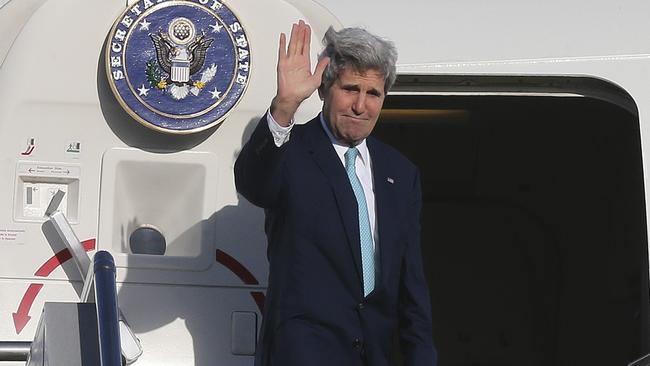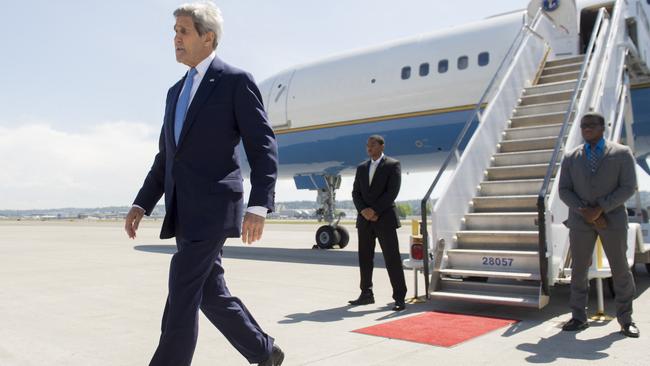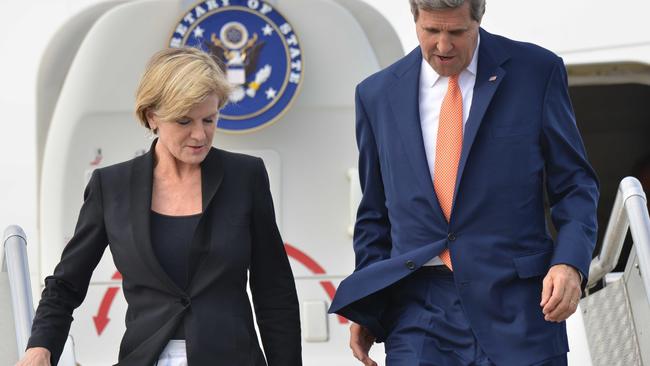John Kerry slams Australia for 2019 UN Climate Change Conference failure
Joe Biden’s new jetsetting climate czar has taken a swipe at Australia, saying it shares the blame for the failure of 2019’s UN Climate Conference in Madrid.
NSW
Don't miss out on the headlines from NSW. Followed categories will be added to My News.
Joe Biden’s new jetsetting climate czar has taken a swipe at Australia, telling former US vice president and climate warrior Al Gore that Australia shares the blame for the failure of 2019’s UN Climate Conference in Madrid and the world needs to move faster to stop using coal.
John Kerry, a former presidential candidate now serving as the US Special Envoy on Climate, told Mr Gore in a half-hour online discussion that “Australia has had some differences with us, we’ve not been able to get on the same page completely”.
“That was one of the problems in Madrid as you recall, together with Brazil.”
“We all have to raise our ambition. That means coal has to come down faster,” he said.

At 2019’s climate conference, the Morrison government was criticised for using “carry-over credits” to meet Australia’s Paris emissions reduction goals.
But in a further indication of the anti-fossil fuels direction the Biden administration’s environmental policies will likely take, Mr Kerry also endorsed the work of teen climate activist Greta Thunberg and school strike movements, as well as “environmental justice” policies that restore “fairness” to the economy.
At the same time, the anti-coal Mr Kerry admitted that even if large nations cut their emissions to zero, the world would not be able to hit his ambitious targets, saying, “Even if tomorrow China went to zero, or the United States went to zero, you know full well … we’re not going to get there”.
“We are going to have to have an all-of-the-above approach” to meet net zero 2050 targets, he said, listing technologies such as hydrogen and batteries, but not nuclear.
The US last week formally rejoined the Paris climate agreement.

Hours after recommitting to the deal, Mr Biden said that nations “can no longer delay or do the bare minimum to address climate change” otherwise “we will all pay the price”.
Not everyone was happy with Mr Kerry’s comments.
“John Kerry’s unprecedented attack on Australian workers is unbecoming of a senior US White House official. By signing the US back up to the Paris Climate Agreement, Biden and Kerry have sold out American workers to China, which is unconstrained by the climate agreement,” said Daniel Wild, research director at free market think-tank the Institute of Public Affairs.
“Australia is reducing its emissions at a faster rate on a per capita basis than the US. John Kerry should stick to his knitting and worry about his own country before he points his finger at Australians.

It is not the first time Mr Kerry has attacked Australia’s coal industry.
In 2019, speaking at the Global Food Table conference in Melbourne, Mr Kerry made a pointed jab at his hosts, saying, “We just can’t sit on our asses and leave the political process to Neanderthals who don’t want to believe in the future”.
“We have a dearth of leadership but this will turn.”
Referring to the controversy over Queensland’s Adani coalmine, Mr Kerry told the conference: “I got to tell you, we should not be moving to coal, we should not be encouraging coal, we should not be building infrastructure around coal.”
Mr Kerry’s climate activism has long been criticised, given his own personal carbon footprint.
Also in 2019, Mr Kerry — who is married to ketchup heiress Theresa Heinz Kerry and has access to the family’s private jet — defended using the aircraft to pick up the Arctic Circle Award for Climate Leadership in Iceland by saying, “it’s the only choice for somebody like me who is travelling the world to win this battle”.
COAL FACTS
■ Australians employed directly in coal mining: 50,000-62,000
■ Australians employed indirectly in coal mining: Approx 120,000
■ Royalties paid by coal industry: $6bn (2018-19)
■ Value of Australian coal exports: $64bn
■ Top export markets: Japan, China, India, South Korea, Taiwan (2019 figures, does not take into account recent Chinese blocks)
Sources: IPA, Minerals Council of Australia, Australian Government





